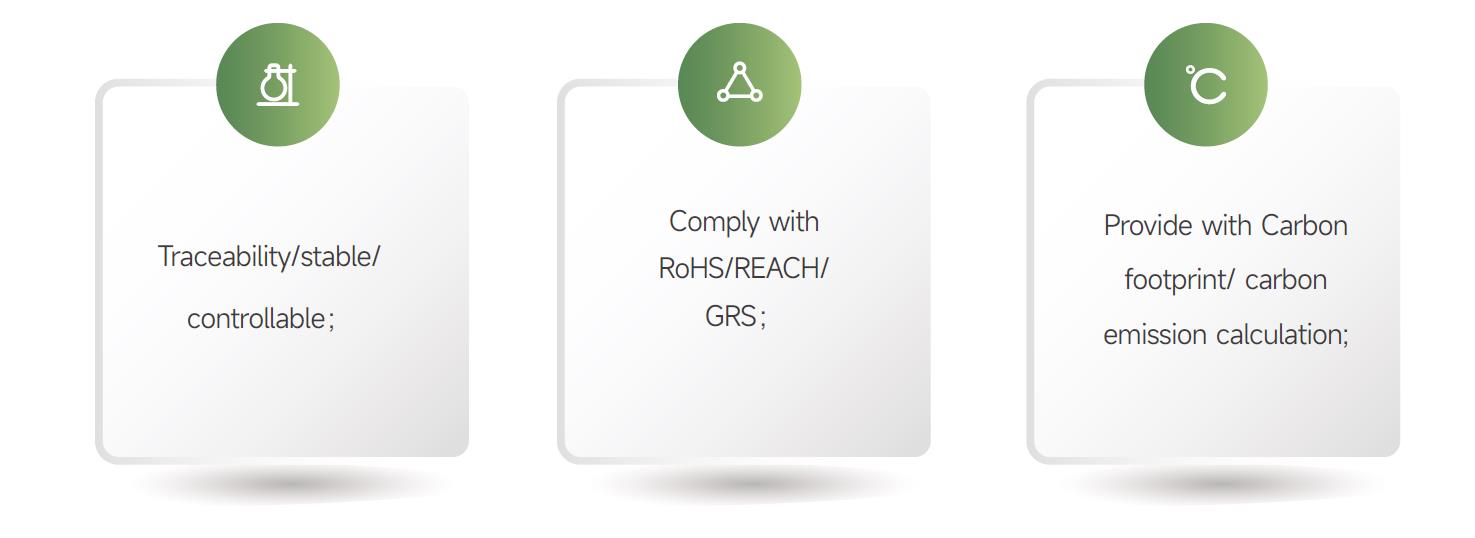
iCircular PC Alloy compounding is prepared from post-consumer recycled polycarbonate (PCR PC®), recycled Acrylonitrile Butadiene Styrene (IBISS® rABS), recycled Polyethylene terephthalate (TC-Rester® rPET) or recycled alloy pellets. The high gloss, electroplating, color matching rPCAlloyBlend™ products can be provided. All-round customized system solutions and innovative solutions also can be provided according to special requirements.

| Typical Grade | Characteristic | MFI (g/10min) | Notched Impact Strength (KJ/m²) | Flexural Modulus (MPa) | Vicar Softening Temperature (°C) | UL 94 | Appearance | PCR Content (%) | Carbon Footprint (t CO2/t) | Application |
|---|---|---|---|---|---|---|---|---|---|---|
| PC/ABS-N00(GPO1J60) | Excellent processability/impact/heat resistance | 15-25 | 40 | 2300 | 125 | HB 1.2mm | Natural and all colors | 95+ | 0.669 | Electronic equipment/appliance/automobile |
| PC/ABS-N00(GPO1J80) | Excellent processability/impact/heat resistance | 15-25 | 50 | 2350 | 130 | VO 1mm HB 1.2mm | Natural and all colors | 90+ | 0.671 | Electronic equipment/appliance/automobile |
| PC/ABS-N00(EP01J40) | High gloss/electroplating grade | 10-20 | 60 | 2000 | 105 | HB 1.2mm | Natural and all colors | 90+ | 0.668 | Appliances/automobile/electroplating parts |
| PC/ABS-N00(LG01J60) | Low gloss/Gloss<50 | 15-25 | 45 | 2400 | 120 | HB 1.2mm | Natural and all colors | 95+ | 0.662 | Appliances/automobile |
| PC/ABS-G10(GPO1J70) | high modulus/heat resistance | 30-40 | 8 | 4250 | 136 | HB 1.2mm | Natural and all colors | 85+ | 0.644 | Appliances/automobile |
| PC/ABS-G20(GPO1H60) | 20% GF/high modulus/heat resistance | 10-20 | 8 | 5300 | 137 | HB 1.2mm | Natural and all colors | 75+ | 0.616 | Appliances/automobile |
| PC/ABS-N00(FRO1J70) | HFRR | 13-19 | 20 | 2400 | 105 | VO 1.5mm | Natural and all colors | 80+ | 0.670 | Electronic controller housing/charging head/TV shell |
| PC/ABS-N00(FRO2J70) | HFRR, high impact resistance | 15-21 | 50 | 2400 | 110 | VO 1.5mm | Natural and all colors | 80+ | 0.832 | Electronic controller housing/charging head |
| PC/ABS-N00(FHO1J80) | HFRR, HD1>100°C/high impact/heat resistance | 17-23 | 50 | 2400 | 130 | VO 1.5mm | Natural and all colors | 80+ | 0.834 | Electronic controller housing/charging head/ |
| PC/ABS-M20(FRO1J60) | Low temperature resistance, solvent resistance | 15-25 | 45 | 2200 | 125 | HB 1.5mm | Natural and all colors | 90+ | 0.846 | Automobile spray parts |
| PC/PBT-N00(LT01J70) | Impact/solvent resistance,synayable | 10-20 | 50 | 2000 | 120 | HB 1.5mm | Natural and all colors | 90+ | 0.879 | Automobile spray parts |
| PC/PBT-N00(H01J70) | Chemical resistance, anti-LV impact/resistance | 30-40 | 40 | 2000 | 125 | HB 1.5mm | Natural and all colors | 90+ | 0.882 | Automobile/Electronic equipment/industrial machinery |
| PC/PBT-N00(CRO1J60) | 30%GF | 10-20 | 10 | 5300 | 150 | HB 1.5mm | Natural and all colors | 65+ | 0.913 | Connector/switch/appliance |
| PC/PBT-G30(GPO1G50) | Heat/impact resistance, anti-LV | 5-15 | 40 | 2100 | 135 | HB 1.5mm | Natural and all colors | 95+ | 0.818 | Outdoor apparatus/appliance |
PCPET-N00(GPO1J90)
15% GF, high flow, high heat resistance, dimensional stability, sprayable
CircleBlend®,rPCAlloyBlend®,ITEBlend®,OBPBlend®,AppBlend®,ReAutoBlend® ;

Products can be used for injection molding, which can be applied in automobile exterior trim, power shell, electric equipment shell, TV shell, etc.


We offer a wide variety of materials, including general plastics, engineering plastics, and specialty plastics, covering almost all types of recycled polymers.

With a dedicated R&D team, we continuously innovate and develop high-performance, customized material solutions to meet diverse industry needs.

From research and testing to manufacturing and sales, we provide end-to-end solutions, streamlining the supply chain for our clients.

Our products promote low-carbon, circular economy practices,supporting global sustainability efforts with bio-based and degradable materials.
Sustainable low - carbon functional materials are applied across numerous critical areas. In the energy sector, they are pivotal. For instance, advanced photovoltaic materials with low - carbon manufacturing processes are used to construct more efficient solar panels. These materials enhance the conversion of sunlight into electricity, contributing to the expansion of renewable energy sources and reducing reliance on fossil fuels.
In the textile industry, sustainable low - carbon functional materials are making waves. Bio - based and recycled fibers are being used to create fabrics. These materials not only consume less energy during production but also have a lower environmental impact compared to traditional synthetic fibers. Moreover, some functional textiles made from these materials can regulate body temperature, repel water, or provide UV protection, all while maintaining a low - carbon footprint.
In the textile industry, sustainable low - carbon functional materials are making waves. Bio - based and recycled fibers are being used to create fabrics. These materials not only consume less energy during production but also have a lower environmental impact compared to traditional synthetic fibers. Moreover, some functional textiles made from these materials can regulate body temperature, repel water, or provide UV protection, all while maintaining a low - carbon footprint.


